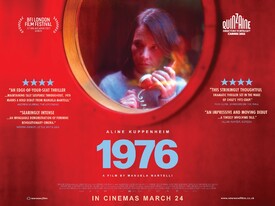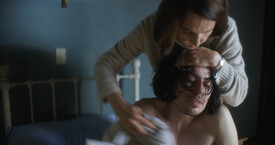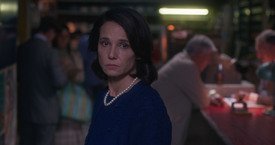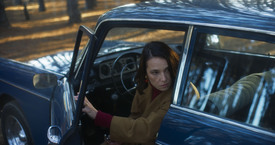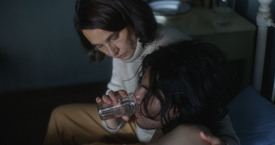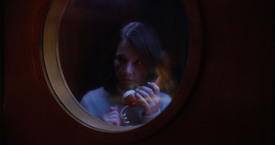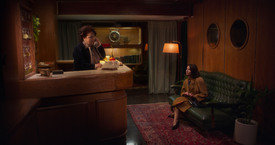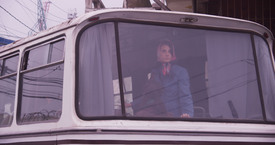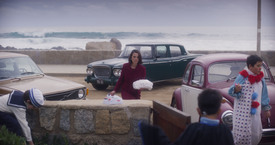★★★★
"An outstanding performance from Aline Küppenheim is the driving force in this engrossing suspense drama-thriller...
1976 is made with thrilling assurance, and the tension and Carmen's spiritual crisis are superbly conveyed, with a nerve-jangling score by María Portugal.
It is a terrific feature debut from performer turned director Manuela Martelli, who herself acted opposite Küppenheim in the film Machuca."
Peter Bradshaw, The Guardian
"Küppenheim is excellent, and the tension keeps building."
The Sunday Times
★★★★
"Compelling...Aline Küppenheim is terrific... (she) excels as a bourgeois housewife whose eyes are opened to a the true cost of life in a military dictatorship."
Wendy Ide, The Observer
★★★★
"A gripping study of paranoia during the early years of the Pinochet regime. As historical noir, Martelli's film is thrilling, but as a document of the comforts of complicity and the terror of resistance, 1976 is visceral."
Christopher Machell,
Cinevue
★★★★
"This strikingly thoughtful dramatic thriller tells a story set in the wake of Chile's 1973 coup...It's beautifully shot and edited, and performed with steely uderstatement by a gifted cast."
Rich Cline, Shadows on the Wall
★★★★
"Beautifully shot, edited and performed by a gifted cast. Mariá Portugal's dark electronic score amplifies the atmospher of mounting dread. 1976 was made by a female crew and the female point of view stands out."
Alexa Dalby, Movies1
"Set three years into Augusto Pinochet’s dictatorship, Manuela Martelli’s unnerving debut feature presents a blistering portrait of the ways in which the regime realised its culture of intimidation and fear.
Martelli uses allusion, metaphor, and potent, distinctive imagery with consummate skill to capture the pulse of a dictatorship that sought to silence its critics and conceal its abuses."
Maria Delgado, Sight & Sound
★★★★
"With its ominous synthesiser score and expressive use of colour, this is a stylistically assured slow-burner - one that blends the personal and political to powerful effect."
Tom Dawson, Total Film
★★★★
“This searingly intense character study sees a woman questioning her cosy bourgeois lifestyle in Pinochet’s Chile.
Martelli's film exquisitely evokes Carmen's muted revolutionary spirit, making for an invaluable demonstration of feminine revolutionary cinema."
Marina Ashioti, Little White Lies
Marina Ashioti, Little White Lies
★★★★
"An oblique, suggestive exploration of the times...
Though the real horror remains offstage...Küppenheim is terrific as a glossily numb and stifled matriarch finding some surreptitious adventure in the world of the resistance.
Stephen Troussé, Uncut magazine
★★★★
"Actor-turned-director Manuela Martelli's brilliant character study immerses viewers in the paranoid political landscape of 1970"s Chile. This worried obsession also materialises in Mariá Portugal's arresting sound design. The eerie, anxiety-inducing soundtrack is realised with odd-timed whistles and brilliantly disturbing electronic waves...
Emily Maskell, We-Love-Cinema
★★★★
"An edge-of-your-seat thriller that flawlessly captures the look and feel of its setting while maintaining taut suspense throughout, 1976 marks a bold debut from Manuela Martelli."
Andrew Murray, The Upcoming
"The kind of elliptical political drama in which Latin cinema excels, containing its threat in the corners of recesses of the action, slowly building an atmoshphere of tensian and fear. As a young actress in 2004, Martelli appeared in the landmark Chilean film Machuca, which foucussed on the early days of the coup: with her first film as a director, she's reutrned to the subject with thrilling style and intelligence."
Demetrios Matheou, The Arts Desk
★★★★
“The thing that makes 1976 stand out most from other films in its vein is the female aspect. One might even say this is in part where the ambiguity of the character stems from Carmen’s story is thus a truly female story, told by Martelli and other women with an understanding of its emotions that a male director could never achieve.
“Excellently told and acted political thriller. Küppenheim’s performance in the central role is a perfect mixture of confidence and unease.”
Marc van de Klashorst, International Cinephile Society
“An impressive and moving debut from actor turned director Manuela Martelli offers a subtle, unobtrusive evocation of Chile in the 1970s.
The blend of character study, Hitchcockian intrigue and an excellent central performance from Aline Kuppenheim makes for a tensely involving tale.”
Allan Hunter, Screen
“A gripping Pinochet-era drama directed by Manuela Martelli… the buzzed up title represents the first feature from young Chilean actor-turned-director Manuela Martelli, star of Andrés Wood’s “Machuca” and Alicia Scherson’s “Il Futuro.”
“1976,” a Cannes buzz title, garnered three top awards at the Toulouse Latin American Festival’s Films in Progress, including the pix-in-post competition’s Grand Prix and Cine Plus Award from Canal Plus.”
Holly Jones, Variety
“Ratchets up the tension…Manuela Martelli”s feature debut, 1976, explores one woman’s struggle with misogyny and corruption under Pinochet.
“Equal parts character study and taut political drama. Martelli and Moffat build tension by keeping the audience guessing when (or if) the other shoe will drop as Carmen’s fate becomes more intertwined with Elías’s.”
Linday Pugh, Seventh Row
“Manuela Martelli’s absorbing drama”Kuppenheim is captivating as Carmen, letting the occasional emotion through a steely facade, and when information is passed from one character to another at great personal cost, every expression and every intricate detail Martelli and crew invest in “1976” feels invaluable.”
Stephen Saito, The Moveable Fest
"Manuela Martelli’s tale of Pinochet’s dictatorship from a female POV (is)a period piece about the daily life of a leisured mother scored with ‘70s synthesizers’ anticipating horror. The jarring music underscores sense of dissonance between Carmen’s public persona and private self as she awakes to the contemporary reality of Chile.
“Genre tropes seep into the film. There’s an echo of French “polar” crime thrillers – think Jean-Pierre Melville – in Carmen’s car journeys, and the story of principled outsider battling far larger odds, but rarely portraying their feelings, as the films builds to grim reckoning."
Emmanuel Levy, Cinema 24/7
